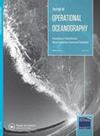采用粒子轨迹建模方法支持南非海上搜救行动
IF 2.4
3区 地球科学
Q4 METEOROLOGY & ATMOSPHERIC SCIENCES
引用次数: 3
摘要
为救援人员进行海上搜救行动提供快速决策支持和更精确的搜索区域坐标的能力对海洋和海事利益相关者具有很高的影响价值。搜索和救援行动依靠有关海洋气象条件的准确信息来定位海洋中的物体。这些包括当地的知识、海洋和风的预报以及洋流、海面风和被搜索物体之间的经验漂移关系。为了给搜救人员寻找海上失踪人员或物体提供更准确的决策支持,将虚拟粒子跟踪工具与经验Leeway漂移模型相结合。拉格朗日海洋搜索目标(LOST)应用程序建立在拉格朗日海洋分析框架的基础上,该框架已经过调整,可根据实际海洋和风力预报提供物体位置的实时估计。loss综合了洋流、地面风和随机运动的影响,后者对于计算在海洋和风预报中无法解决的亚网格尺度过程至关重要。本研究评估了LOST的准确性,通过将其应用于南非区域海洋的三个用例,证明了其作为搜索和救援行动决策支持工具的可行性。这些用例是真实的场景,突出了将最先进的海洋和风预报系统与拉格朗日海洋分析框架和子网格尺度参数化相结合的价值,以支持全球业务海洋学。本文章由计算机程序翻译,如有差异,请以英文原文为准。
Towards a particle trajectory modelling approach in support of South African search and rescue operations at sea
ABSTRACT The ability to provide rapid decision support and more precise search area coordinates for rescuers to conduct search and rescue operations at sea are of high impact value for marine and maritime stakeholders. Search and rescue operations rely on accurate information about metocean conditions to locate objects in the ocean. These include local knowledge, operational ocean and wind forecasts and empirical drift relationships between ocean currents, ocean surface winds and the objects being searched for. To provide more accurate decision support for rescuers looking for persons or objects lost at sea, a virtual particle tracking tool was combined with an empirical Leeway drift model. The Lagrangian Ocean Search Targets (LOST) application builds on a Lagrangian ocean analysis framework which has been adapted to provide real-time estimates of the positions of objects based on operational ocean and wind forecasts. LOST incorporates the impact of ocean currents, surface winds and stochastic motion, the latter being critical in accounting for sub-grid scale processes that are not resolved in the ocean and wind forecasts. This study assesses the accuracy of LOST, demonstrating its feasibility as a decision support tool for search and rescue operations by applying it to three use cases in the South African regional ocean. These use cases are real-life scenarios that highlight the value of combining state-of-the-art ocean and wind forecasting systems with Lagrangian ocean analyses frameworks and sub-grid scale parameterisation to support global operational oceanography.
求助全文
通过发布文献求助,成功后即可免费获取论文全文。
去求助
来源期刊
CiteScore
7.50
自引率
9.70%
发文量
8
审稿时长
>12 weeks
期刊介绍:
The Journal of Operational Oceanography will publish papers which examine the role of oceanography in contributing to the fields of: Numerical Weather Prediction; Development of Climatologies; Implications of Ocean Change; Ocean and Climate Forecasting; Ocean Observing Technologies; Eutrophication; Climate Assessment; Shoreline Change; Marine and Sea State Prediction; Model Development and Validation; Coastal Flooding; Reducing Public Health Risks; Short-Range Ocean Forecasting; Forces on Structures; Ocean Policy; Protecting and Restoring Ecosystem health; Controlling and Mitigating Natural Hazards; Safe and Efficient Marine Operations

 求助内容:
求助内容: 应助结果提醒方式:
应助结果提醒方式:


